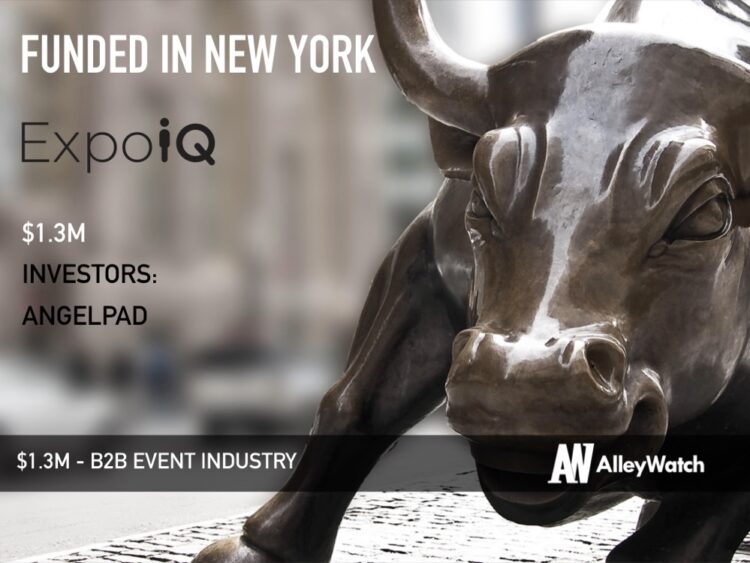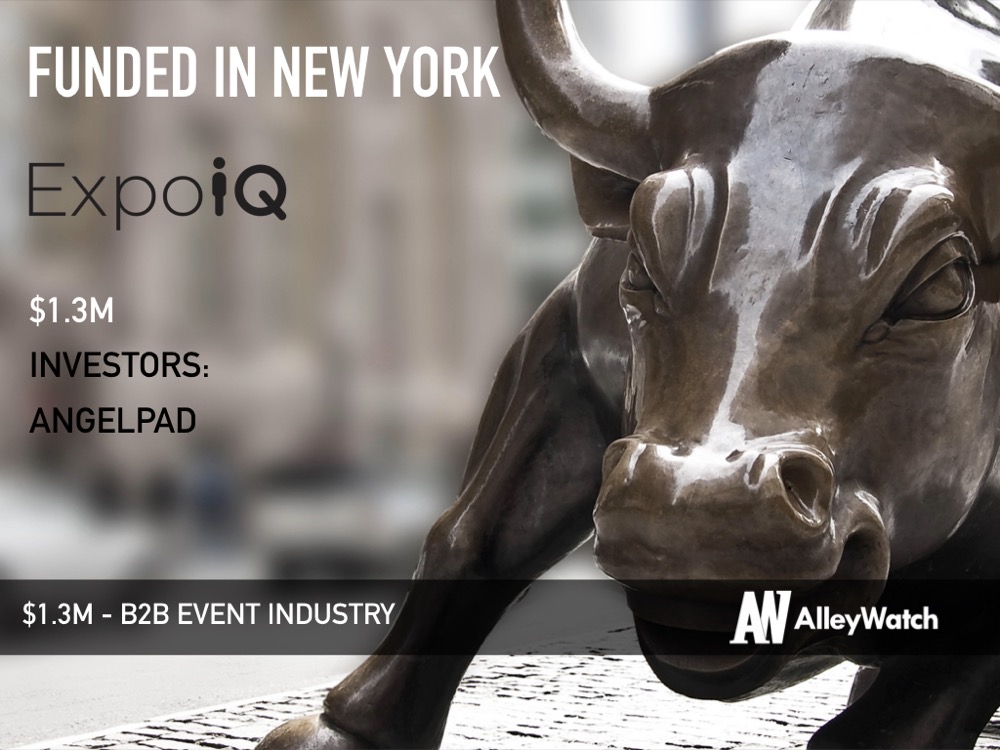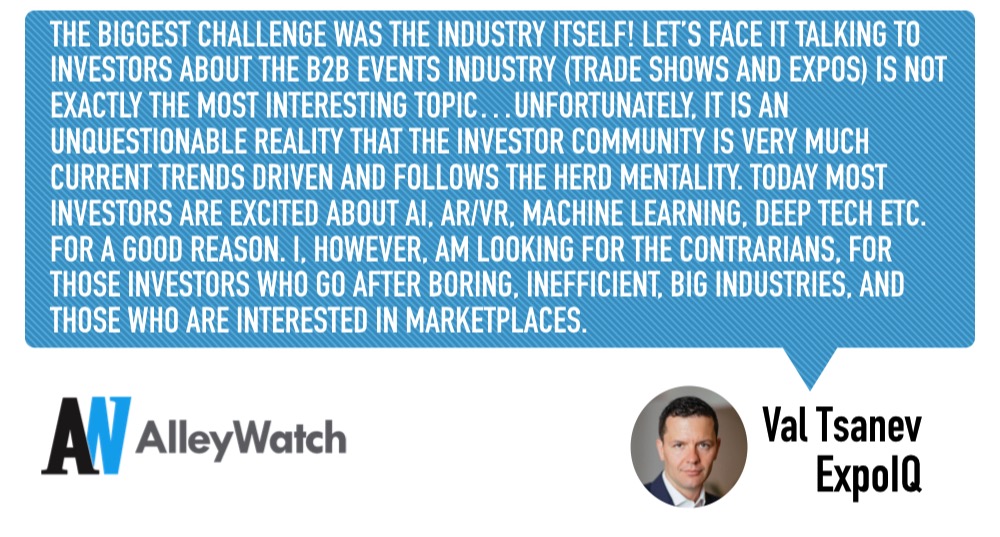The B2B event industry is $30B, and the trade show exhibition segment, in particular, is a $16B industry. The most prominent trade shows have great exhibitors; however, finding new exhibitors and gaining access to exhibitors poses a significant problem for trade show organizers because information has traditionally not been centralized. ExpoIQ tackles this problem through its marketplace that connects trade show organizers with exhbitors. Focused on IT trade shows, the company’s database already includes 20K + IT exhibitors, 5K + IT expos, and 30K + key decision makers at IT exhibitors.
AlleyWatch spoke with the ambitious founder Val Tsanev about how his drive and determination led him to create this company that is poised to disrupt the B2B event industry and its adjacent markets.
Who were your investors and how much did you raise?
We raised $1.3M to date and the investors included several independently wealthy individuals and AngelPad, where ExpoIQ (formerly ConferencePulse) was accepted in the accelerator and graduated in May 2018.
Tell us about the product or service that ExpoIQ offers.
ExpoIQ is a marketplace that helps sales and marketing professionals of expo producers find and book introductory calls with relevant new exhibitors in minutes. We are specifically focused on the IT industry.
What inspired you to start ExpoIQ?
I have been heavily involved in the industry for the last 2 years and I have noticed that the B2B events industry is arguably one of the biggest and most impactful industries in the US (the exhibition sector generates more than $81B in direct GDP) and yet data is extremely decentralized in the public domain. The current process of connecting the different constituents in the trade show industry is very inefficient and manual, so I saw a huge opportunity in building a marketplace that facilitates those interactions. Having said that, I also do believe the face-to-face interactions will always remain the cornerstone of this industry.
We have developed a very extensive database of 20,000+ IT exhibitors, 5,000+ IT expos, and 30,000+ key decision makers of IT exhibitors and cross-reference of these data sets makes us unique. We graduated last year from AngelPad, #1 ranked accelerator in the US, we also won last year the IBTM award for best marketing startup in the B2B events industry and some of the biggest names in the technology expo sector are already our clients (e.g., O’Reilly Media)
What market does ExpoIQ target and how big is it?
We target sales and marketing professionals of expo producers who are looking to find relevant new exhibitors for their respective trade shows. The trade show exhibition industry alone is a $16B industry, if we include conferences and business events you very quickly get to $30B.
The IT sector is only the beginning, eventually we plan to expand to all the other industry sectors within the trade show industry. Our “north star” though is to eventually go after all the adjacent markets to the B2B events industry (i.e., hotels, air travel, speakers, sponsors, food catering, event services companies) and bring them into our marketplace in the context of the B2B events industry.
Just to give you a sense of how big ExpoIQ can become if we execute successfully against our vision, just the air travel industry attributes $118B out of the $850 billion per year to people traveling to and from different trade shows and conferences. About $50B is spent on food catering, so I hope people realize the immense impact we can have for the B2B events industry- especially if we make our “north star” vision a reality.
What’s your business model?
We charge the expo producers 10% success fee/commission of the total dollar amount exhibitors eventually end up paying them to exhibit at their IT expos. Exhibitors don’t pay us anything to be featured on our marketplace.
Who do you admire in the startup world and why?
I am a huge fan of Chamath Palihapitiya (Social Capital), Simon Sinek (Author/Motivational Speaker), Joel Gascoigne (Buffer), Jason Lemkin (SaaStr), Jason Calacanis (Angel Investor) and James Currier (NFX).
I admire all these individuals for pretty much the same reasons: they are prolific thinkers in the startup universe, have great transparency, are very outspoken, are not afraid to highlight their personal views, and constantly contribute valuable insights into the public domain – without expecting anything in return. They also challenge the status quo and think big and have unique perspectives.
Most importantly, none of them came from rich families and they all worked extremely hard to get to where they are. I am a firm believer that it is all about grit and perseverance; the rest is secondary in the startup universe.
Most importantly, none of them came from rich families and they all worked extremely hard to get to where they are. I am a firm believer that it is all about grit and perseverance; the rest is secondary in the startup universe.
What was the funding process like?
Difficult! As it always is for any entrepreneur with very few exceptions. I have interacted with more than 60 VCs and have met in person more than 30 of them, and I learned a ton from each one of these interactions. The funding process is so brutal that it humbles you as a founder and in a good way teaches you to become extremely self-aware and cognizant of your limitations, which in turn can make you a better entrepreneur and a better person.
What are the biggest challenges that you faced while raising capital?
For me, the biggest challenge was the industry itself! Let’s face it talking to investors about the B2B events industry (trade shows and expos) is not exactly the most interesting topic for most of them. Unfortunately, it is an unquestionable reality that the investor community is very much current trends driven and follows the herd mentality. Today most investors are excited about AI, AR/VR, machine learning, deep tech etc. for a good reason. I, however, am looking for the contrarians, for those investors who go after boring, inefficient, big industries, and those who are interested in marketplaces. As for the rest, I just don’t think we are a fit.
What factors about your business led your investors to write the check?
My biggest investor bet on me, as a person. He has known me for a decade, he has seen me in action, and he knows I don’t give up and can execute.
I do believe that being an immigrant gives me an immense competitive advantage: when I was 8 years old I stayed on line to buy bread in communist Bulgaria for 7 hours and 21 minutes, and it was that moment that I decided I will do everything possible to never experience this again in my life. I also then realized another truth: I will never be afraid of dying but I will be horrified of not trying my best in anything I do.
I also then realized another truth: I will never be afraid of dying but I will be horrified of not trying my best in anything I do.
It’s tough to compete with someone who genuinely believes he has nothing to lose. Of course, the fact that $512B is spent by Fortune 500 companies on events marketing, the fact that the exhibition sector generates more than $81B in direct GDP, ranking as the 56th largest economy in the world and the fact that exhibitions generated $71.7K total sales per exhibiting company, and $870 per square foot of venue gross indoor exhibition space contributed to the ultimate decision to write the check.
What are the milestones you plan to achieve in the next six months?
We are currently exclusively focused on getting to product market fit as fast as possible, get our unit economics in place and bring awareness of ExpoIQ in the technology expo sector.
What advice can you offer companies in New York that do not have a fresh injection of capital in the bank?
I will give a very honest and unfortunately painful response to this question: no matter what investors tell you the bar has moved up a lot. If you don’t have a product in market, don’t have some real validation of clients’ demand, and can’t show at least 3-6 months of key performance indicators for your business moving up and to the right (ideally growing 10% per week) it’s highly unlikely you will get funded by institutional investors. Everybody says that it is very inexpensive to start a business and that is true; however, scaling the business is what matters and that takes significant capital. My advice for first-time founders is to focus on your business, not on investors, investors will come if you get your business going and prove initial client demand. The first call should be to your friends and family, those people who know and trust you and are willing to bet on you and not on the business. I suggest that is the capital you cherish the most and feel the most responsible for, even more than your own capital. All investors say they bet on the founders/people, but what many don’t mention is that they bet on founders/people IF there is also significant business traction. Although it is frustrating for many founders, I don’t blame the investors for demanding some real traction before investing, after all, they do have a fiduciary responsibility to their LPs. I honestly don’t believe that any institutional investor will invest in a startup with no traction just because they liked the founder(s); maybe only if the founder(s) already had a meaningful exit but otherwise it is unrealistic to expect it. When it comes to investors look for those who before they meet you are already believers of your main thesis, sector, and industry. Convincing non-believers is a lost cause.
Where do you see the company going now over the near term?
We are aggressively on-boarding relevant IT expo producers and exhibitors on our platform and are hiring for some key early roles. Ultimately priority number one for us is to make sure that we have liquidity in our marketplace (i.e., we facilitate meaningful and repeatable interactions between the expo organizers and exhibitors). For any marketplace, I firmly believe that before you worry about anything else you have to make sure that your platform has created liquidity. Interactions between the producers and consumers in the early stage of a marketplace are the only things that truly matter and will define whether the startup makes it or breaks it.
What’s your favorite restaurant in the city?
I have a few restaurants I really like but Levante in Long Island City comes to mind.






